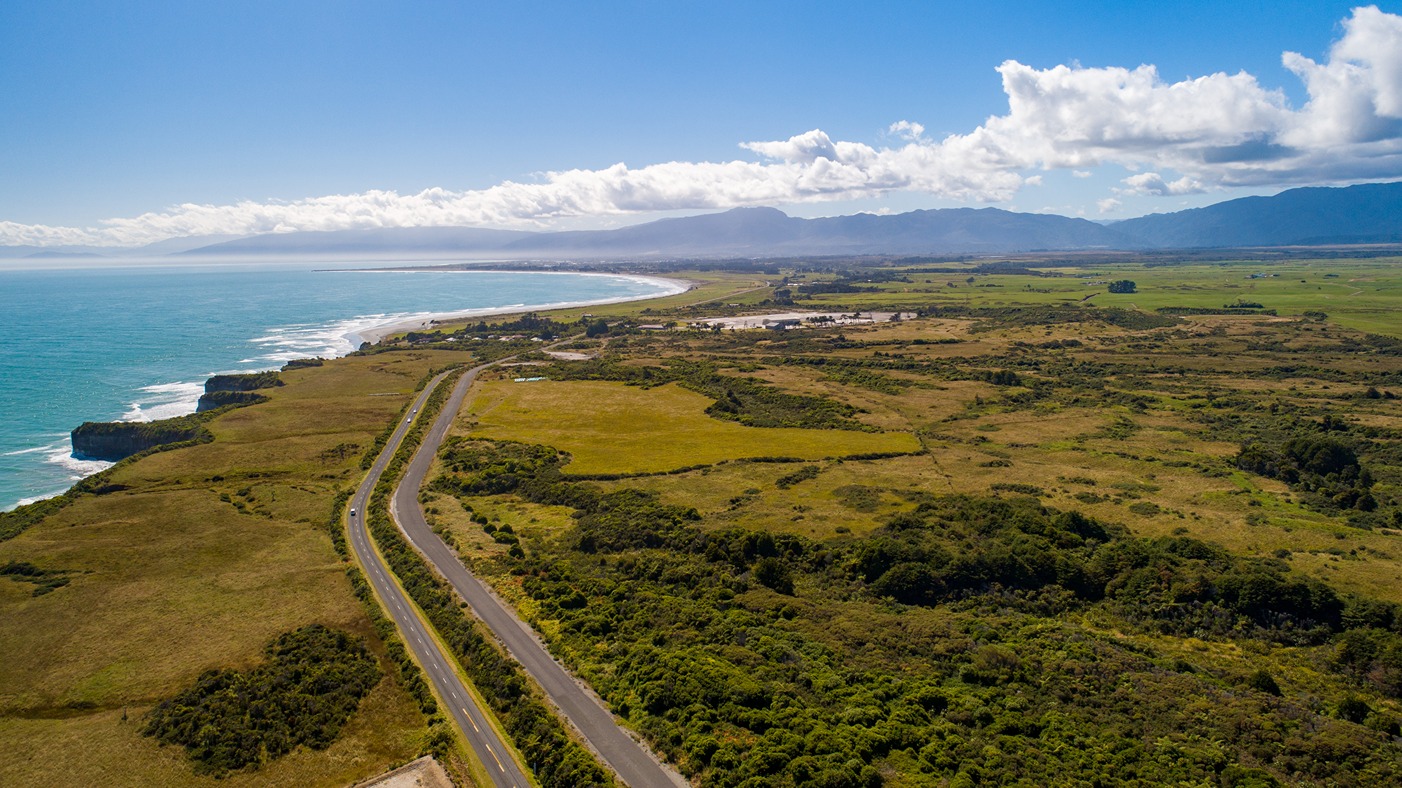Central Government funded projects
Several projects are underway to reduce the impact of flooding on Westport and plan. A Steering Group which includes members of both the Buller District and West Coast Regional Councils, Ngāti Waewae and Central Government has been established to provide governance, oversight, and assurance of the deployment of $22.9m of Government funding towards building a Resilient Westport.
The work programmes include several projects across the PARA framework (Protect, Avoid, Retreat/Relocate and Accommodate) to deliver a Resilient Westport for the future. The work programmes need to carefully balance moving things along at pace with the need for good process and transparency. The community’s voice is central to the programmes of work and there will be opportunities for engagement and feedback.
Actions that are part of increasing the districts and Westport’s resilience for future generations include:
Flood protection assessments (protect)
- Organs Island reafforestation – Land transfer process underway and planning for planting.
- Floating Lagoon and Averys – geotechnical groundwater monitoring is underway. A plan for a stop bank on the Avery’s stretch of the Orowaiti River is estimated to provide protection from a one-in-100-year flood for the next 30 years of climate change.
- Abattoir Drain at Railway Bridge & McKenna Road - geotechnical groundwater monitoring underway. Assessment of environmental effects are underway. All going well, these are aimed to be completed these by the end of June 2024.
Flood protection structures (protect)
- Peer reviews of the Multi Tool Business Case that was submitted to government in June 2022 have now been completed. Next stage is preliminary design phase.
- While these initiatives will help deliver flood protection, they are not a guarantee of prevention of damage from future flooding. These measures are buying time to enable Westport to plan a more resilient future.
Civil defence emergency management (accommodate)
- Recruit for capability; delivery; sustainability – underway
Water and sea level gauge (accommodate)
- Funding has been approved for sea level monitoring and tide gauging to improve flood warning information.
- WCRC are completing assessments of the tidal and land monitoring requirements, auditing best practical options so the steering group can be assured of design before progressing to purchase of equipment.
Westport master planning (retreat/relocate)
- Stage one of the master planning process has begun. BDC has engaged Isthmus Urban Design team (based in Christchurch) to develop a set of vision plans with which to engage with the community in early 2024.
- Isthmus has worked on projects around New Zealand and internationally.
- The Master Planning project will ensure we're planning for a future focused on social, environmental, affordability, prosperity, and culture.
- We're working in a partnership of community, iwi, business, local government, and national government.
Westport Water Resilience
Westport Water Supply remains in need of critical investment to mitigate risk of “no water” scenarios. During the February 2022 severe weather event, significant damage was sustained to both infrastructure and the Giles Creek south branch catchment. Whilst the infrastructure was quickly repaired via government funding, the event showed the vulnerability of this essential lifeline.
As a result, Council worked closed with the Department of Internal Affairs (DIA) to identify the most important infrastructure needed to improve resilience for the Westport Water Supply, culminating in a business case highlighting the prioritised Resilience Options. This was endorsed by Council and submitted through the previous governments National Transition Unit as part of the Three Waters Reform programme. As we await further direction from the new governments Local Water Done Well plan, critical investment in Westport Water Supply must continue to ensure the safe, reliable and adequate drinking water supply for our district’s largest population.
Currently there is no back up water supply for Westport. The alternative pump station constructed downstream of the primary intake in 2005 has been rendered unusable due to the poor water quality. In the event of regular or prolonged rainfall events, raw water cannot be treated with the existing water treatment plant due to excessive turbidity levels. Even a series of smaller rainfall events occurring in close succession may stop or restrict refilling of the reservoir ponds, resulting in storage reducing to empty. Another severe weather event could damage critical infrastructure causing an instant supply loss. In either scenario, Westport could face “no water” crisis.
The prioritised Resilience Options investigation and report recommended several short, medium, and long-term responses to secure the Westport Water Supply and improve reliability and availability. The most critical of the short to medium term investments is to complete replacement of the Trunk Main from the current location near McKenna Rd into Queen St finish point and associated network capacity improvements. The estimated cost of this key project is $3.15 million.
Solid Waste
A public consultation on proposed changes to the waste management system was held between August and September 2023. The consultation was focused on switching from ‘pay as you throw’ rubbish bags, in waste and recycling zone 1, to wheelie bins for rubbish collected fortnightly, funded via a targeted rate.
The key findings from that consultation revealed some support for wheelie bins, but there were concerns from residents over making costs mandatory and the impact it would have on minimal waste producers.
The elected members met in an early November 2023 to discuss waste management going forward and as part of a workshop for the Enhanced Annual Plan decided to go back to the community to consult on three options how waste could be managed in Buller in the future. This consultation is now running parallel to the 2024-2025 Enhanced Annual Plan consultation as a Special consultative procedure (SCP) pursuant to the Local Government Act 2002 section 83.
If you want to have your say on the proposed options for waste management, please see Council’s website or view the Statement of Proposal available at Council’s offices and libraries in Westport and Reefton, i-Sites, and resource centres across the district.
Creation of a Regional Water CCO
With the repeal of the Affordable Waters Legislation, Minister, Hon Simeon Brown has spelt out a three-step process to implement Local Water Done Well (LWDW) over the next 12-18 months. Stage one of that process has already occurred with the repeal of the Water Services Legislation in February 2024.
The Minister has established a technical advisory group to develop exact details of the next steps of LWDW. The indications from Central Government are that in June 2024 legislation will be introduced and enacted that set a framework to enable councils to self-determine future service delivery arrangements. It is also expected that councils will be required to produce a funded plan within 12 months as to how water will be delivered.
This legislation will include streamlining of requirements to establish Council Controlled Organisations to enable more financially sustainable service delivery.
The final piece of legislation in LWDW is planned for enactment mid-2025 which is expected to introduce greater central government oversight, economic and quality regulation and developing a new class of financially separate council-owned organisations.
Council has identified and shared with the community the current and potential future cost to ratepayers of water and wastewater services which are unaffordable to the community. It seems unlikely a “go it alone” water services model would be affordable for our communities in future and meet the LWDW requirement to show financial sustainability, where financial sustainability means revenue sufficiency, balance sheet separation, ring-fencing, and funding for growth.
However, it has been made clear in recent correspondence from the minister the expectation that councils should be voluntarily seeking collaborative solutions to long term water services delivery with neighbouring councils if that aids a financially sustainable model. Council unanimously voted on the 27th March 2024 to allow the Mayor to write to every Council in the South Island of NZ to understand if they would be keen on starting discussions around the creation of a CCO.
The commercial analysis and development of a regional CCO is likely to be a major project requiring significant resources and take considerable time to prepare.




